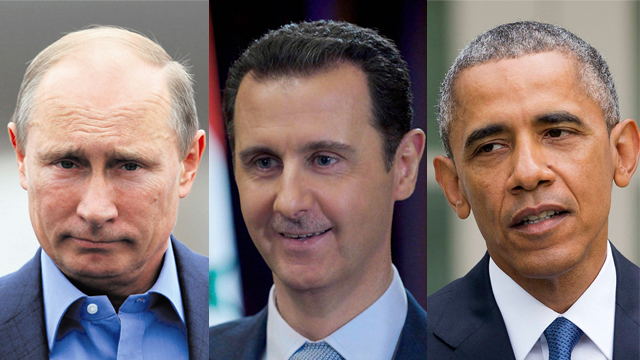Analysis: Syria shatters Obama’s Middle East legacy
Joyce Karam/Arab News/January 10/17
WASHINGTON, DC: As he takes the stage to deliver his farewell speech from Chicago in a few hours, do not expect US President Barack Obama to delve into his Middle East accomplishments, partly because in the view of experts they are either non-existent, drowned by chaos or greatly diminished. US experts who closely watched Obama’s rhetoric fall apart in the region, or served in his administration and saw first-hand how indecision and half-measures created an unprecedented void and chaos, tell Arab News that Syria is the epicenter of his administration’s train wreck in the Middle East.
The “leading from behind” doctrine
Even before the Arab Spring started in 2011, Obama’s larger doctrine for the Middle East and North Africa was defined by the “US stepping back so others can step in,” and doing so “regional actors can rise to the occasion and take responsibility,” said Shadi Hamid, a senior fellow at the Brookings Institution in Washington. The “leading from behind” approach shaped the early thinking of the Obama administration by prioritizing the withdrawal from Iraq, cutting civil society aid programs to Egypt, allowing the Gulf Cooperation Council (GCC) to take a lead role in Yemen, and later leading to Russia’s intervention in Syria.
There was a small caveat that the Obama team missed: This approach “doesn’t work in the Middle East,” said Hamid, because “the US has the misfortune of having bad actors in the region, so while it’s true that others stepped in, they were countries that didn’t share our interests or values.”Frederick Hof, director of the Rafik Hariri Center for the Middle East at the Atlantic Council, says Obama’s main pitfall was the Syrian war. Hof, who served as a special adviser on Syria and coordinator for regional affairs at the State Department in Obama’s first term, tells Arab News that Obama’s failure over Syria “transcends the Middle East.”The former US official said: “By combining florid rhetoric with dogged inaction in the face of civilian slaughter in Syria, Obama facilitated a humanitarian catastrophe that spilled into Europe, undermining the continent’s political unity and compromising its trans-Atlantic relationship with the US.”
Hof blames Obama’s “enormous gap between talk and action” in Syria, by calling on Syrian President Bashar Assad to step down in 2011 without a Plan B. It was also by drawing a red line for the Syrian regime over the use of chemical weapons, which Obama altered in 2013. These levers “emboldened a Russian president to alter European boundaries and to intervene militarily in Syria… and are behind the loss of confidence in Washington by long-time regional partners of the US,” said Hof.
From Syria to Brexit and Trump
Hamid, the author of “Islamic Exceptionalism: How the Struggle Over Islam is Reshaping the World,” links the crisis in Syria to an “undermined liberal order” across Europe, and a wave of instability that has shaken not just the country’s neighbors but also the UK, Germany and France. “Syria was never just about Syria, and while Obama assumed it can be contained, not only has it not been contained, the spill-over effects of Syria have threatened the stability of the entire Middle East and the very European project,” says Hamid.
According to the UN High Commissioner for Refugees, more than half of Syria’s population of 22 million has been displaced, with more than 5 million having fled the country, creating a massive refugee influx into Turkey, Jordan, Lebanon and Europe.
The influx into Europe, coupled with the rise of Daesh during Obama’s second term, has translated into fear and a rapid spike in identity politics across the Continent and the United States. “The Brexit outcome could not have happened had it not been for fears of Muslim immigration, and (US President-elect Donald) Trump might not have won if it were not for Syria,” said Hamid. “What happens in the Middle East has reshaped and undermined the entire liberal order as we know it.”
Prioritizing the Iran nuclear deal
Hof and Hamid agree that Obama’s political capital was entirely spent in the Middle East on negotiating and later promoting the Iran nuclear deal, designed to curb the country’s nuclear program and possibly breaking the decades of animosity between Tehran and Washington.
Hof said between 2012 and 2015, “what seemed to motivate the administration’s inaction in Syria more than anything else was fear of alienating the regime’s closest ally Iran.” The deal with Iran in July 2015 “was, and is seen by Obama, as the jewel in his legacy crown.”
However, the nuclear deal did little to nothing to slow Tehran’s expansionist policies, says Hamid, while cutting the number of centrifuges did not relate to citizens of the region witnessing bloodshed across Syria, Yemen, Libya and Iraq. The Syria death toll reached 470,000 last February, according to the Syrian Center for Policy Research, more than double the Algerian and Lebanese civil wars, which lasted 11 and 15 years, respectively.
But beyond the humanitarian suffering, it is also the geopolitical implications of the Syria conflict that have sunk Obama’s Middle East legacy, said Hof. History will recognize “a president and senior aides who spoke movingly, eloquently, and often about human suffering and its political consequences, but who did next to nothing about it.”


















